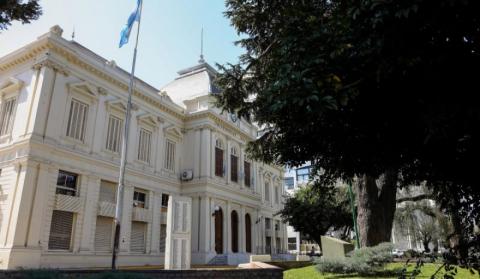Universidad Nacional de La Plata - IFLP (CONICET/UNLP)
Institute
The UNLP was founded in 1905. At present, it is a well-known and prestigious institution for professional training, with 110.000 students. Within the area of science and technology, the UNLP has an outstanding structure with 150 research institutes, among them, the Instituto de Física de La Plata (UNLP-CONICET).
The scientific research programs at IFLP concern theoretical physics, material science, and high energy physics (HEP experiments and phenomenology)
The activities of the HEP group are focused on understanding the fundamental particles of matter and the physics laws that governed their interactions. The group is deeply involved in several major experimental efforts: the ATLAS experiment at LHC (Large Hadron Collider, CERN) and the Pierre Auger Observatory (Mendoza, Argentina).
Within the ATLAS collaboration the group is active in the study of the properties of the Higgs Boson and has a keen interest in searches for for Supersymmetry (SUSY) and new particles and forces. In the field of high energy astrophysics with the Pierre Auger Observatory the group investigates the nature of ultra high energy cosmic rays to understand their origin.
In connection with these experiments, the theory research effort covers a wide range of fields, including phenomenology of elementary particles, astroparticles and hadronic matter. The activities encompass model-building topics as well as more experimentally oriented projects.
The IFLP HEP group consists of around 20 people comprising academics, research staff, PhD students plus additional support staff and academic visitors.
La UNLP fue fundada en 1905 y en el presente representa una prestigiosa y conocida institución de formación profesional con más de 110.000 estudiantes. Dentro del área de ciencia y tecnología, la UNLP tiene una infraestructura de excelencia con 150 institutos de investigación, entre ellos el Instituto de Física de La Plata (UNLP-CONICET).
El programa científico del IFLP involucra física teórica, ciencia de materiales y física de altas energías (experimentos y fenomenología).
Las actividades del grupo de altas energías tienen como objetivo contribuir a la comprensión de las partículas fundamentales de la materia y las leyes físicas que rigen sus interacciones. Contempla investigaciones experimentales y fenomenologías con participación en dos de los experimentos más trascendentes de la actualidad: ATLAS del LHC (Large Hadron Collider, CERN) y el Observatorio Pierre Auger (Mendoza, Argentina).
Dentro de la colaboración ATLAS las actividades incluyen estudios de distintas propiedades del bosón de Higgs y búsquedas de Supersimetría y nueva física. En el campo de astropartículas en el Observatorio Pierre Auger, las investigaciones desarrolladas tienen como objetivo entender el origen y la naturaleza de los rayos cósmicos de ultra alta energía.
El grupo realiza también investigaciones en la fenomenología de las partículas elementales, astropartículas y materia hadrónica. Esta actividad contempla estudios estrechamente vinculados a los desarrollos experimentales antes mencionados.
El grupo de altas energías del IFLP tiene alrededor de 20 miembros, incluyendo investigadores, profesores, estudiantes de doctorado y la contribución adicional de investigadores visitantes.


